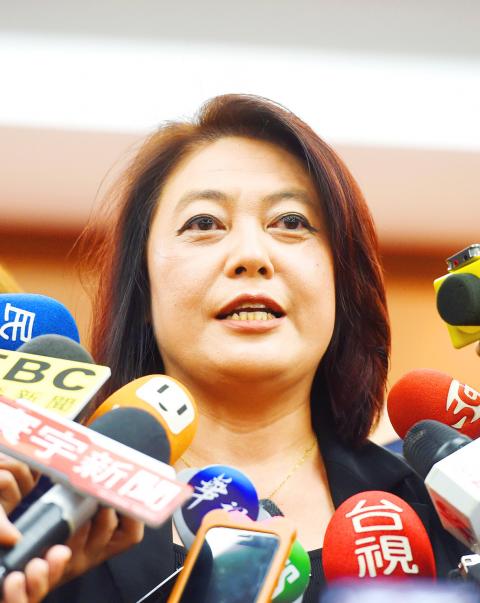National Communications Commission (NCC) Chairwoman Nicole Chan (詹婷怡) yesterday tendered her resignation to Premier Su Tseng-chang (蘇貞昌), who approved it last night.
“I have cherished every day at the commission since I took office in August 2016. I have worked hard to execute my duties under the framework of the Fundamental Communications Act (通訊傳播基本法) and the National Communications Commission Organization Act (國家通訊傳播委員會組織法),” she wrote on Facebook.
Chan also thanked President Tsai Ing-wen (蔡英文) and NCC Deputy Chairman Wong Po-tsung (翁柏宗), as wells as commissioners and agency staff for their support and efforts.

Photo: Fang Pin-chao, Taipei Times
Her resignation came after Su and Democratic Progressive Party (DPP) lawmakers last month accused the NCC of failing to curb the spread of misinformation, which they said almost caused DPP Legislator Kuo Kuo-wen (郭國文) to lose a legislative by-election in Tainan.
Chan also came under scrutiny after a person who claims to be an NCC staffer told the local Chinese-language media that she attended events unrelated to the commission’s work and asked staffers to prepare presentations for the events.
Chan said that she has been a pioneer and practitioner of the vision for a “beautiful and digital” Taiwan, because it involves the nation’s development in the post-digital convergence age and would determine whether it could evolve into a more profound democracy.
She does not fear the unknown or facing difficulties, and addresses challenges by working with like-minded people, she said.
“I truly believe that what the nation needs right now is a wake-up call, and all of us should work hard to reduce tensions between political groups, change the mindset, set up common goals that benefit all and enhance the efficiency of governance. Only by doing so can the nation avoid the pitfalls of a democratic system and digital development. This requires great wisdom,” Chan said.
She said she would continue to fight for Taiwan with the same conviction regardless of where she is or in which capacity she serves.
Her tenure was originally set to end on July 31 next year, the commission said.
Chan, 51, received a bachelor’s degree in law from National Taiwan University and a master’s degree in intellectual property laws from the University of London.
Before serving as NCC chairwoman, Chan was the director of the Science and Technology Law Institute.
She was also an executive producer of the film Dragon Dance (龍飛鳳舞) and a producer of the film Seven Days in Heaven (父後七日).
In 2016, Chan was nominated by former premier Lin Chuan (林全) and approved by the Legislative Yuan to lead the commission, becoming its first non-academic chairperson.
Her father, Chan Yi-chang (詹益彰), was a Control Yuan member and a prominent figure in the Chinese Nationalist Party (KMT).
Chan is also viewed as being close to pan-green camp politicians.

MAKING WAVES: China’s maritime militia could become a nontraditional threat in war, clogging up shipping lanes to prevent US or Japanese intervention, a report said About 1,900 Chinese ships flying flags of convenience and fishing vessels that participated in China’s military exercises around Taiwan last month and in January last year have been listed for monitoring, Coast Guard Administration (CGA) Deputy Director-General Hsieh Ching-chin (謝慶欽) said yesterday. Following amendments to the Commercial Port Act (商港法) and the Law of Ships (船舶法) last month, the CGA can designate possible berthing areas or deny ports of call for vessels suspected of loitering around areas where undersea cables can be accessed, Oceans Affairs Council Minister Kuan Bi-ling (管碧玲) said. The list of suspected ships, originally 300, had risen to about

DAREDEVIL: Honnold said it had always been a dream of his to climb Taipei 101, while a Netflix producer said the skyscraper was ‘a real icon of this country’ US climber Alex Honnold yesterday took on Taiwan’s tallest building, becoming the first person to scale Taipei 101 without a rope, harness or safety net. Hundreds of spectators gathered at the base of the 101-story skyscraper to watch Honnold, 40, embark on his daredevil feat, which was also broadcast live on Netflix. Dressed in a red T-shirt and yellow custom-made climbing shoes, Honnold swiftly moved up the southeast face of the glass and steel building. At one point, he stepped onto a platform midway up to wave down at fans and onlookers who were taking photos. People watching from inside

Japan’s strategic alliance with the US would collapse if Tokyo were to turn away from a conflict in Taiwan, Japanese Prime Minister Sanae Takaichi said yesterday, but distanced herself from previous comments that suggested a possible military response in such an event. Takaichi expressed her latest views on a nationally broadcast TV program late on Monday, where an opposition party leader criticized her for igniting tensions with China with the earlier remarks. Ties between Japan and China have sunk to the worst level in years after Takaichi said in November that a hypothetical Chinese attack on Taiwan could bring about a Japanese

STREAMLINED: The dedicated funding would allow the US to transfer equipment to Taiwan when needed and order upgraded replacements for stockpiles, a source said The US House of Representatives on Thursday passed a defense appropriations bill totaling US$838.7 billion, of which US$1 billion is to be allocated to reinforcing security cooperation with Taiwan and US$150 million to replace defense articles provided to the nation. These are part of the Consolidated Appropriation Act, which the US House yesterday passed with 341 votes in favor and 88 against. The act must be passed by the US Senate before Friday next week to avoid another government shutdown. The US House Committee on Appropriations on Monday unveiled the act, saying that it allocates US$1 billion for the Taiwan Security Cooperation Initiative